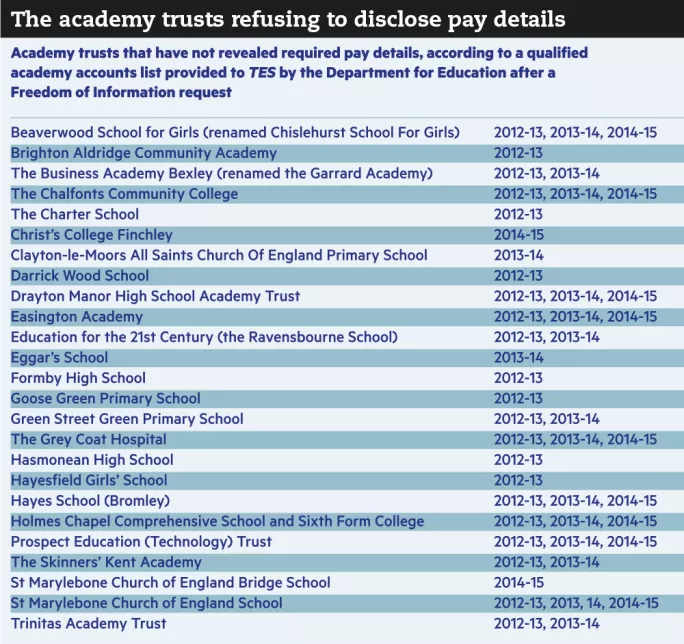
Academies break pay rules by refusing to reveal salaries

More than two dozen academy trusts have refused to comply with government transparency rules about disclosing the salaries of directors and highly paid employees, TES can reveal.
One school, whose chair of trustees is Lord Ashcroft, the former deputy chairman of the Conservative Party, has had auditors formally qualify (fail to fully sign off) its accounts for six years in a row because it has not adhered to the regulations.
In total, 93 sets of academy accounts were given a qualified opinion between 2012-13 and 2014-15, meaning that auditors thought they did not give a “true and fair view” of the company’s affairs, had not been properly prepared in accordance with UK Generally Accepted Accounting Practice or were not in accordance with the relevant regulations.
In the majority of cases (48 sets of accounts, from 25 different trusts), the concerns over the accounts centred on information given about the pay of the principal or chief executive, or other staff who were also trust directors or governors.
The news comes after TES revealed that the pay of academy chief executives continued to rise last year, with Sir Dan Moynihan, of the Harris Federation, receiving an increase of at least £20,000 (bit.ly/AcadPay). This information was only available because it was published in academy accounts.
Mary Bousted, general secretary of the ATL teaching union, said there were “real concerns” about chief executive pay and transparency should “start at the top”.
Dr Bousted added: “If it’s the law, it should be complied with. There should not be any excuses, particularly around the spurious issue of commercial confidentiality.
“Schools that do not fulfil their legal requirements in terms of transparency need to understand that these will enforced.”
A TES analysis of the list of qualified accounts, released after a Freedom of Information request, showed that, in another 31 sets of accounts, the auditors’ concerns were connected to the value of land or buildings used by the academy. In another five, there wasn’t enough information about the pensions of staff who were members of the local government pension scheme.
No confidentiality clause
When preparing their accounts, academy trusts must follow the annual Academies Accounts Direction, issued by the Education Funding Agency.
The document says they must include the salary and benefits paid to the principal and/or chief executive if they are a governor and therefore a director and trustee, as well as the same information for other members of staff who are also trustees and therefore directors.
The information “must include the name of each trustee in receipt of remuneration and other benefits, and details of the amounts involved”, and warns that “confidentiality cannot be used as a reason for non-disclosure of principals’ and other trustees’ remuneration”.
The direction also says the accounts must state how many staff earned more than £60,000, in bands of £10,000.
If it’s the law, it should be complied with. There shouldn’t be any excuses
The Prospect Education (Technology) Trust - the sponsor of Ashcroft Technology Academy in Putney, which is named after Lord Ashcroft - is the only academy trust in the country with accounts that have been qualified for six years in succession over pay since 2011.
In 2013-14, auditors said accounts were “not compliant” with the Academies Accounts Direction because they did not reveal the pay of staff earning more than £80,000, in bands of £10,000.
They added: “The trustees have chosen to omit this information on the grounds of both confidentiality and business sensitivity.”
TES has contacted the school for comment.
Allan Hickie, who chairs the national academies group for accountants UHY Hacker Young, said he sympathised with lower-paid staff who had to disclose their pay if they became trust governors or directors.
He told TES: “There has been a lot of uproar about it. There have been schools that have had governors that have resigned because of it, and some have refused to put the information in to stop that happening.”

However, he emphasised the need for openness about higher-paid staff.
“Trusts generally should have an independent remuneration committee and the principal should not be involved in setting their own salary,” Mr Hickie said. “There’s a perception that if they are on the board of the trust, they may be able to influence what they are paid, so I think it’s right that it should be in the open.”
‘Discouraging skilled staff’
A number of qualified accounts cite “personal privacy” for not releasing pay details, while one says that an analysis of how much staff governors are paid will be provided - “if deemed appropriate” - through writing to the headteacher.
As previously reported by TES (“Academy heads’ salaries jump”, Insight, 13 January), the 2014-15 accounts for Hayes School in Bromley say that “governors have decided not to disclose the remuneration of the principal and staff governors” - one of five successive years that the information was missing.
Principal Stephen Whittle said then: “We have chosen not to do so in order not to discourage committed and skilled staff from putting themselves forward for this voluntary role.”
A Department for Education spokesperson said: “Academies operate under a strict system of oversight and accountability - more robust than in council-run schools - which means any issues are identified and swift action can be taken.
“We take breaches of the handbook seriously and respond proportionately according to the scale and nature of the issue. The vast majority of academy trusts’ accounts are unqualified.”
You need a Tes subscription to read this article
Subscribe now to read this article and get other subscriber-only content:
- Unlimited access to all Tes magazine content
- Exclusive subscriber-only stories
- Award-winning email newsletters
- Unlimited access to all Tes magazine content
- Exclusive subscriber-only stories
- Award-winning email newsletters
You need a subscription to read this article
Subscribe now to read this article and get other subscriber-only content, including:
- Unlimited access to all Tes magazine content
- Exclusive subscriber-only stories
- Award-winning email newsletters
- Unlimited access to all Tes magazine content
- Exclusive subscriber-only stories
- Award-winning email newsletters